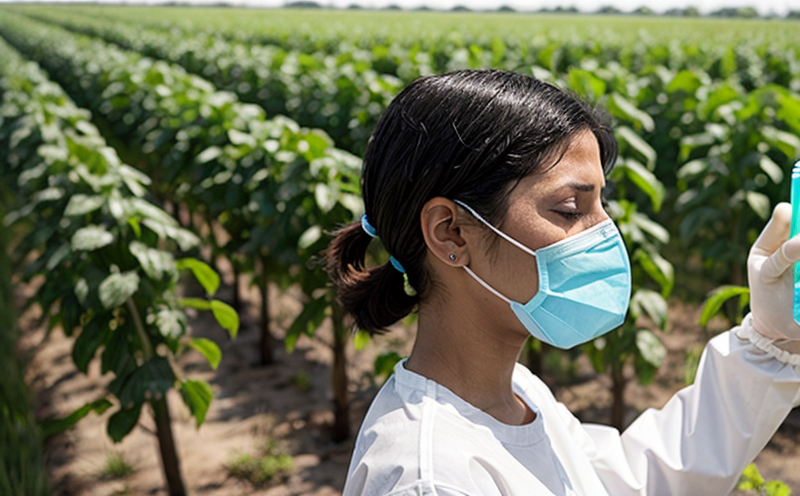ISO 15913 Organochlorine Pesticides by GC MS Test in Water
The ISO 15913 Standard sets out a rigorous methodology for the quantitative and qualitative analysis of organochlorine pesticides (OCPs) in water samples. This method employs gas chromatography-mass spectrometry (GC-MS) technology, which offers unparalleled accuracy, sensitivity, and selectivity in detecting even trace amounts of these harmful chemicals.
Organochlorines are a class of persistent organic pollutants that have been widely used as pesticides, particularly before the 1970s. They persist in the environment for long periods, bioaccumulate in organisms, and can pose significant risks to human health and aquatic ecosystems. The ISO 15913 test is crucial for environmental monitoring, water quality assessment, and compliance with regulatory standards such as the USEPA's Maximum Contaminant Levels (MCLs).
The testing procedure involves several critical steps:
- Sample Collection: Proper sampling protocols are essential to ensure representative samples. Samples should be collected from various points in water bodies, considering factors like flow rate, temperature, and turbidity.
- Preparation of Samples: The collected water samples undergo thorough filtration and dilution if necessary, ensuring that the concentrations fall within the linear range of the GC-MS instrument. Properly prepared samples are then ready for analysis.
- Analytical Process: In this step, the sample is introduced into the gas chromatograph, which separates the compounds based on their physical and chemical properties. The separated components are then directed into a mass spectrometer, where they ionize and undergo fragmentation to generate characteristic mass spectra. These spectra allow for precise identification of OCPs.
- Data Analysis: Following analysis, the mass spectral data is compared against reference standards to identify and quantify the organochlorine compounds present in the water sample. Calibration curves are used to determine the concentrations of each compound detected.
- Reporting Results: The final report includes detailed information on the presence and concentration levels of OCPs, along with any recommendations for remediation if levels exceed safety thresholds.
The ISO 15913 test is not only a regulatory requirement but also an essential tool in environmental research. It helps researchers understand the environmental fate of organochlorine pesticides over time and assess their potential impact on ecosystems. By identifying OCPs early, water utilities can take proactive measures to protect public health and the environment.
The GC-MS technology used in this testing method is highly sophisticated, with capabilities far beyond simple detection. It can differentiate between closely related compounds, making it possible to detect even minute traces of these pollutants. This level of precision is critical for ensuring accurate and reliable results.
Water quality managers, compliance officers, and R&D engineers rely on the ISO 15913 test to ensure that water supplies meet stringent safety standards and regulatory requirements. The test also supports the development of safer alternatives to organochlorine pesticides in agricultural practices.
Industry Applications
The ISO 15913 Organochlorine Pesticides by GC MS Test finds application across various sectors, including:
- Agricultural Sector: Monitoring the presence of OCPs in irrigation water to ensure food safety and compliance with international standards.
- Water Utilities: Ensuring that drinking water supplies are free from harmful organochlorine residues, thereby protecting public health.
- Educational Institutions: Supporting research on the environmental impact of OCPs in aquatic ecosystems.
- Environmental Agencies: Conducting comprehensive studies to assess the long-term effects of OCPs on wildlife and human populations.
The test is particularly valuable for water utilities that need to ensure compliance with stringent regulatory requirements. By identifying and quantifying OCPs, they can take necessary steps to mitigate risks and maintain water quality at optimal levels.
For agricultural sectors, the ISO 15913 test helps in understanding the environmental fate of pesticides used in farming practices. This knowledge is crucial for developing sustainable agriculture practices that minimize the release of harmful chemicals into the environment.
Why Choose This Test
The ISO 15913 Organochlorine Pesticides by GC MS Test offers several advantages over other testing methods:
- High Sensitivity and Specificity: The test can detect even trace amounts of OCPs, ensuring that no harmful chemicals are overlooked.
- Compliance with International Standards: By adhering to ISO 15913 guidelines, laboratories ensure their results meet the highest international standards.
- Reliable Results: The robust analytical methods employed in this test provide consistent and accurate results, enhancing trust in water quality reports.
- Rapid Turnaround Time: With modern laboratory equipment, results are available quickly, enabling timely corrective actions if necessary.
- Comprehensive Reporting: Detailed reports not only list the presence of OCPs but also provide insights into their potential impact on ecosystems and human health.
- Regulatory Compliance: This test is essential for meeting regulatory requirements set by agencies like the USEPA, ensuring compliance with MCLs.
The ISO 15913 Organochlorine Pesticides by GC MS Test is a cornerstone of environmental monitoring and water quality management. Its ability to detect even minute concentrations of OCPs makes it an indispensable tool for protecting public health and the environment.
Competitive Advantage and Market Impact
The ISO 15913 Organochlorine Pesticides by GC MS Test provides significant competitive advantages in several ways:
- Enhanced Reputation: Offering this advanced testing method enhances the reputation of water utilities and environmental agencies, demonstrating their commitment to high standards.
- Informed Decision-Making: By providing accurate and reliable data on OCP levels in water supplies, these entities can make informed decisions regarding resource allocation and operational strategies.
- Market Leadership: Companies that invest in this technology set themselves apart from competitors by offering superior products and services related to water quality management.
- Innovation and Research: The test supports ongoing research into the environmental impact of OCPs, fostering innovation in sustainable practices and technologies.
The market for advanced water quality testing is growing as more stakeholders recognize the importance of protecting public health and the environment. By offering the ISO 15913 Organochlorine Pesticides by GC MS Test, laboratories can position themselves as leaders in this evolving landscape.





